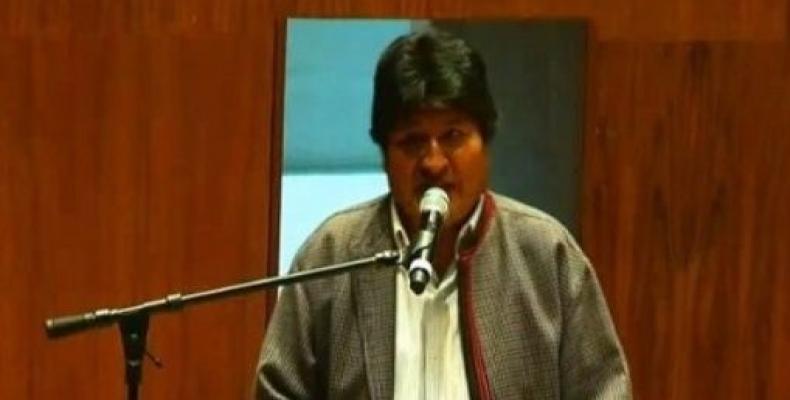Mexico City, November 27 (RHC)-- Bolivia’s exiled President Evo Morales reaffirms that "the struggle does not end here," referring to resistance to the November 10th coup and the establishment of a right-wing government in the South American nation.
The president, who was granted asylum in Mexico, gave a speech during a meeting with students of the National Autonomous University of Mexico (UNAM), in which Vice President Alvaro Garcia Linera and Minister of Health Gabriela Montaño also participated.
"It hurts [to see] so many lost families and how they [the right] are destroying what we have built for the economic liberation," Morales expressed, deploring the death of more than 30 people, as well as the dozens of wounded as a result of the repression carried out against protesters by armed and security forces.
The Bolivian leader reminded the audience that when he assumed the presidency, the country had a high rate of extreme poverty, basic services were almost all privatized and economic development was not as advanced. He recalled that the country's Gross Domestic Product (GDP) represented $9 billion when he won the elections for the first time, while it exceeds today $49 billion, allowing for a better redistribution of wealth among Bolivians.
"Of the 13 years of government we led, Bolivia was during six years the first country in economic growth in the region,” the president said. The former president also denounced the neoliberal interests of the political actors that carried out the coup, as well as the “fascist and racist” practices of the right-wing political factions towards the Indigenous communities, and the violent attacks against the Movement toward Socialism's (Evo's party) supporters, who keep protesting in the streets against the newly self-proclaimed government.
The Bolivian leader also said that the country under former right-wing presidents who studied in the United States to go back home and apply their neoliberal policies, steal the natural resources and dominate and subdue the people in order to be the loyal to Washington's policies in the region.
Evo Morales went on to recall how his three consecutive administrations brought power and dignity to the marginalized groups in a country that was characterized by high levels of inequalities and segregation. During his 14 years in power, Evo implemented policies that promoted steady growth and government investment in social spending.
The nationalizations and fights against privatization allowed the transfer of revenue into the hands of the government which was able to inject that money into public infrastructure.


